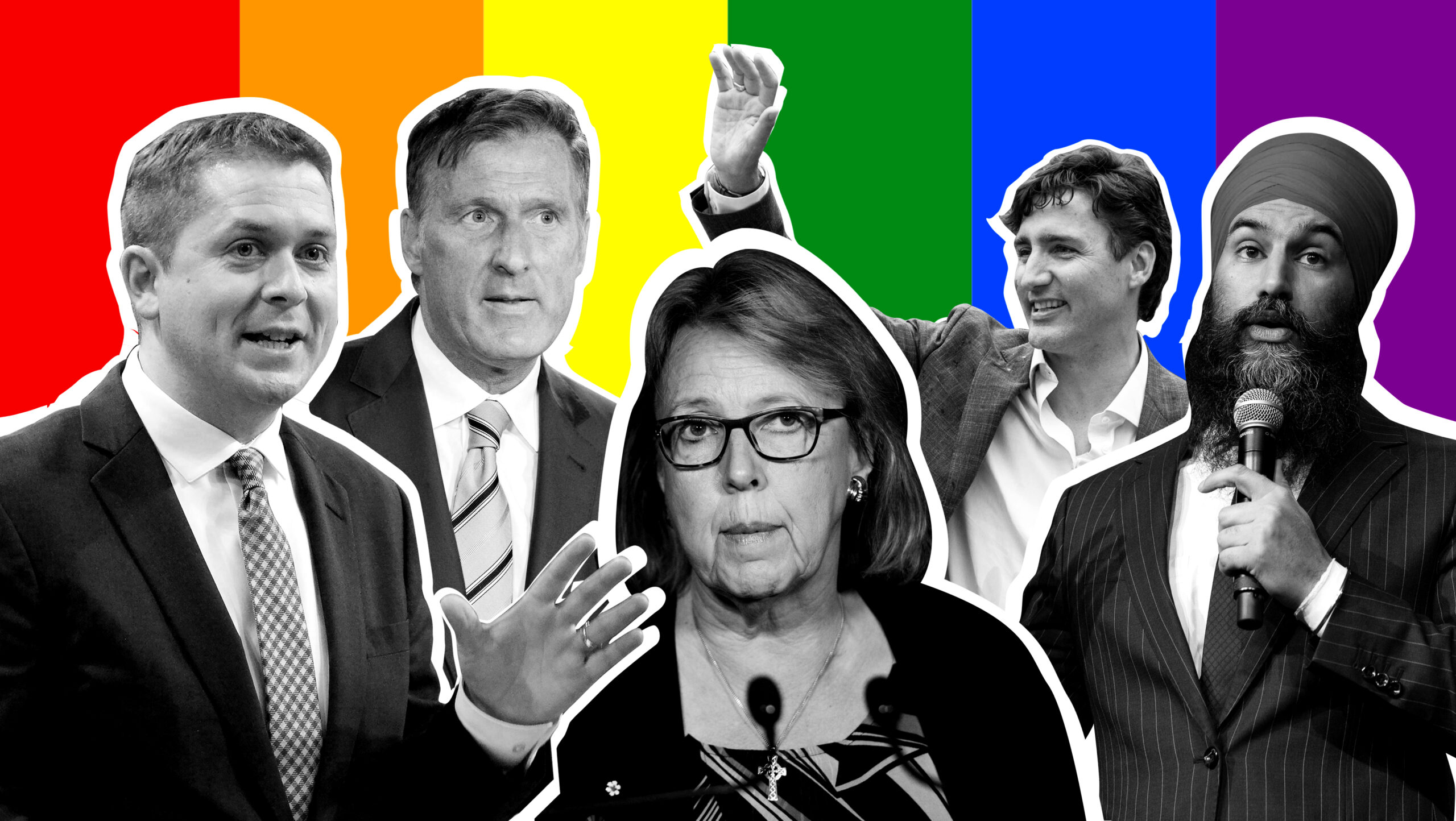The last Canadian federal election in 2015 saw renewed promises for LGBTQ2 issues — from commitments to pass trans-rights legislation to ending the blood ban. But this time around, there’s a brand new People’s Party of Canada all too willing to rail against diversity, while the Conservative Party is being led by Andrew Scheer and his anti-trans, anti-marriage equality, anti-abortion voting record. It’s bound to be an especially tumultuous election for queer and trans Canadians.
To keep voters informed about our political parties’ commitments — and transgressions — we’ve noted each party’s policies on LGBTQ2 issues. And because these policies and promises will be changing throughout the election campaign, we’ll keep this story updated. Be sure to revisit it as campaign season begins.
The Liberal Party
Coming into office in 2015 after 10 years of Conservative governance, the Liberal Party immediately got to work tackling LGBTQ2 issues. Over the past four years, Prime Minister Justin Trudeau’s party has taken a ton of action on those issues, which they’ll definitely be relying on to earn our votes come election day on Oct 21.
Here’s what the party has accomplished since 2015:
– After more than a decade of trans activism, and in large part due to historic and ongoing efforts of New Democrat Members of Parliament (MPs), the Liberal government successfully passed a trans-rights bill — Bill C-16 into law in 2017 — enshrining gender identity and gender expression as protected grounds in the Canadian Human Rights Act and the Criminal Code of Canada.
– On Nov 29, 2017, Trudeau issued an apology on behalf of the federal government to the thousands of public servants, members of the military and police and intelligence employees discriminated against, fired, criminally prosecuted and sometimes imprisoned for their sexual orientation from the 1950s to the 1990s.
– The party appointed Randy Boissonnault, the openly gay MP for Edmonton Centre, as Special Advisor on LGBTQ2 Issues. Trudeau’s government also created the LGBTQ2 Secretariat within the Privy Council to help inform the government on issues and potential solutions of importance to our communities.
– In 2017, the Canadian government became co-chair of the Equal Rights Coalition, the first-ever international, intergovernmental coalition committed to protecting the rights of LGBTQ2 communities around the world.
– This February, the federal government made a commitment to advance human rights and socio-economic outcomes for LGBTQ2 people in developing countries, with $30 million in funding over the next five years, followed by $10 million a year after that.
– Also in February, a petition from NDP MP Sheri Benson called on the federal Liberal government to do more to protect minors from conversion therapy. At the time, the government responded that health regulations are a provincial and territorial responsibility; but they have since shifted their stance. In July, the federal government urged all provinces and territories to ban conversion therapy, and announced they would explore amendments to the Criminal Code to better crack down on conversion therapy.
– In their 2019 budget, the Liberals committed $20 million to LGBTQ2 service organizations to support capacity building and community-level work. On August 1, they committed $400,000 of this funding to support Egale Canada to expand their research work in a national LGBTQ2+ research lab and hub, alongside $100,000 to the Canadian Trans Network to host a Canadian Trans Summit to identify a way forward to trans and non-binary advocacy in Canada.
– Most recently, the Liberal party committed to criminalizing conversion therapy should they be re-elected. This comes eight months after they refused to do so, citing that healthcare is a provincial and territorial responsibility.
For some, their actions have rung hollow. While many applauded the 2017 apology to LGBTQ2 Canadians, others, like Michael Motala, one of the authors of the Egale report The Just Society Report: Gross Indecency, which was commissioned by the Department of Justice, said, “It feels like the government is just using these issues as a bit of a PR stunt and they’re really not tackling things substantively.”
And despite some significant victories, the Liberals haven’t made good on all of their promises to LGBTQ2 communities. The party campaigned in 2015 on a commitment to end the blood ban — which prevents men who have sex with men and trans people from donating blood unless they’ve remained abstinent for a period of time — but have failed to do so thus far. In 2016, the Liberals reduced that time period from five years to one, but the ban still exists despite outcry from LGBTQ2 communities and experts who say it unnecessarily targets queer and trans folks.
The New Democratic Party
While the New Democrats have never been the federal party in power, they’ve had a strong influence on LGBTQ2 issues. They were the first party to formally announce its support for the gay movement in 1976 and were home to Canada’s first openly gay MP Svend Robinson, who came out in 1988.
When the House of Commons voted on marriage equality in 2005, the NDP was the only party that required its MPs to vote in favour. And while Bill C-16 passed under a Liberal government, the NDP championed four separate legislative efforts since 2005 to enact federal trans-rights protections, re-introducing new legislation to keep the issue up for discussion, and building support across political parties.
The NDP’s 2019 platform includes five commitments to LGBTQ2 communities. These include:
– A complete end to the blood ban
– A national action plan to ban conversion therapy for minors in Canada, and work alongside provinces and territories to end the practice across Canada
– Improved access to gender-affirming procedures by working with the provinces and territories to ensure equal access to gender-affirming surgery across the country, and ensure that both surgeries and medication are covered by public health plans
– Establishing a clear and permanent path for resettlement for LGBTQ2+ refugees in Canada
– Ending employment discrimination against LGBTQ2+ communities by adding sexual orientation, gender identity and gender expression to the Employment Equity Act.
Following the announcement that a re-elected Liberal government would criminalize conversion therapy, NDP leader Jagmeet Singh indicated that his party would also ban conversion therapy, and highlighted that the Liberal party had four years in government to do so — but didn’t.
The Conservative Party
Heading into the upcoming federal election, the Conservative Party of Canada is stuck in an uncomfortable position: facing a challenge on one side from Maxime Bernier’s right-wing People’s Party, which has the potential to split the conservative vote, and, on the other side, competing with an incumbent Liberal majority government for the centrist votes crucial to either party’s electoral success. With Andrew Scheer — a staunch social conservative who has voted against marriage equality, trans rights and pro-choice legislation — as its leader, the party seems likely to continue leaning into social conservatism. Scheer claims he’ll keep divisive social issues out of his government’s policies, but whether that’s true is debatable.
While the Conservative platform hasn’t yet been released, the party’s policy book is devoid of any references to LGBTQ2 communities. It’s worth mentioning that this is the party that only struck its definition of marriage as between a man and a woman from its policy book in 2016, more than a decade after Canada legalized same-sex marriage. Some members of the party, like Michelle Rempel and Michael Chong, have broken ranks from their peers in an effort to advance LGBTQ2 issues, with some success. When Bill C-16 came to a vote in the House of Commons, for instance, 38 Conservative MPs voted for it.
Scheer, meanwhile, has refused to march in Pride parades. A Conservative Party of Canada spokesperson defended his position in a statement: “Canada’s Conservatives have a proud history of fighting for the rights and protection of all Canadians, including those in the LGBTQ community, at home and abroad. There are many ways to support these communities, and it is vital that the rights all Canadians are protected regardless of race, gender or sexual preference.”
In July, Scheer responded to the Liberal government announcement that the party would explore a ban on conversion therapy, saying he would “wait and see,” and that the Conservative Party “will always, of course, stand up for the rights of LGBTQ individuals and protect their rights.” But whether or not the party will stay true to Stephen Harper’s legacy and sneak its way to electoral success without any discussion of LGBTQ2 identities remains to be seen.
In response to questions about the commitment from the Liberal party that they would criminalize conversion therapy, Scheer responded that the Conservatives would support legislation to protect LGBTQ Canadians but failed to provide further information on what that support would look like, or if it included criminalizing conversion therapy.
The Green Party
Like the NDP, the Green Party has a strong history of tackling LGBTQ2 issues. In 1996, it became the first federal political party to officially support same-sex marriage, and was the first — and only — major federal political party to have an openly gay leader in Chris Lea.
The Green Party platform includes significant commitments to LGBTQ2 communities, arguably the most extensive of all major political parties. If elected, the Greens commit to:
– Repeal all federal laws and policies that are discriminatory on the grounds of sexuality
– Provide funding to community-based organizations to improve LGBTQ2 youth mental health
– Fund community-driven education and awareness programs on LGBTQ2 identities
– End the blood ban
– Ensure comprehensive access to sexual health care and gender-affirming healthcare, including hormones and surgeries for trans and gender-diverse communities
– Ensure trans and gender diverse communities are able to alter gender identification on federal documents without undertaking medical transition
– Work with social services, the shelter system and community organizations to ensure LGBTQ2 youth are cared for and protected
– Improve the inclusivity of the national census to reflect diverse gender identities and sexualities
– Mandate that washrooms in federal buildings include gender-neutral washrooms and change rooms while affirming the right of trans and gender diverse people to determine their preferred washroom or change room.
The People’s Party of Canada
The People’s Party has been around less than a year, and it’s already collected a slate of candidates with ties to anti-abortion organizations, white supremacist groups and committed transphobes. One of the most infamous: Laura-Lynn Tyler Thompson, the Burnaby-South candidate — who earned more than 10 percent of the vote in a recent by-election — is on the record stating that gender fluidity is “the greatest and most insidious assault against our children that this nation has ever seen.”
Meanwhile, Maxime Bernier, founder and leader of the party, went on a Twitter rant in August 2018, claiming that diversity was threatening to “destroy what has made us such a great country.” Bernier has also spoken out against Bill C-16 in 2017, and previously voted to re-open the marriage equality debate in 2006, though he claims abortion and gender identity won’t be part of his platform.
While the People’s Party hasn’t yet announced its platform, the rhetoric of its leader and the politics of its candidates speak volumes about what we can expect.
Legacy: April 3, 2019 7:00 pmA previous version of this story incorrectly stated that Svend Robinson came out in 1998, not 1988.


 Why you can trust Xtra
Why you can trust Xtra


